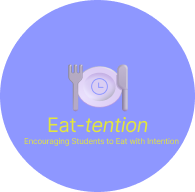︎ Eat-tention
A digital tool designed for University of Michigan students to encourage healthier eating habits by showcasing nearby, time-efficient healthy food options, suggesting calendar reminders, and offering incentives for home cooking.
By Odiso Obiora ︎


Hypothesis
A digital tool that promotes convenient healthy food options, suggests daily food breaks, and incentivizes home cooking will encourage more students to dedicate time to eating well-balanced meals, thus improving overall physical and mental well-being.
A digital tool that promotes convenient healthy food options, suggests daily food breaks, and incentivizes home cooking will encourage more students to dedicate time to eating well-balanced meals, thus improving overall physical and mental well-being.
- Why
Unhealthy eating habits, such as skipping meals, can harm academic performance and mental health. Moreover, a poor diet increases the risk of chronic diseases, reducing overall quality of life. A balanced diet should include a variety of fruits, vegetables, healthy oils, protein, and whole carbohydrates. However, the demands of school and busy schedules often push students toward processed, sugary foods that are more readily available. Research shows that stress can disrupt "normal eating behavior" (Hill et al., 2022). By treating meal times as an intentional activity rather than an interruption, students are more likely to make healthier eating choices.
- How
Wholesome foods often lose their appeal due to their lack of convenience. While vending machines provide nearly instant access, preparing a meal or walking to a restaurant requires more time and effort. By reframing meal times as valuable breaks and showcasing healthy food options as practical and convenient, healthy eating can become more appealing. Suggested restuarants will be informed by a database of avaialble local food options. Consistent literature reviews on nutriton and diet will be conducted to ensure recommendations meet health standards.
- What
Eat-tention is a digital tool – proposed as a feature in the official University of Michigan student app– that empowers students to develop healthier eating habits by:
- Displaying time-efficient healthy food options nearby, making it easier for students to make nutritious choices.
- Suggesting calendar breaks that encourage students to make time for proper meal breaks in their day, promoting not just healthy eating but also improved mental well-being.
- Incentivizing the University of Michigan community to cook at home through a point-based system that rewards students for home-cooking. Participants can compete with friends, earn points, and redeem them for discounts and rewards at local restaurants and grocery stores. When you eat better, you live better. This tool empowers student to structure their time so that making healthy choices becomes convenient and routine, positively influencing their mental and physical health.
- So What

In-app healthy food recommendations

Suggested meal breaks enabled by app
The Link Between Design and Outcomes
Healthy eating habits, promoted by this digital tool, will lead to a lower risk of chronic disease, higher academic performance, and a better quality of life.
︎
Works Cited
1. Harvard School of Public Health. “What Should I Eat?” The Nutrition Source, September 18, 2012. https://nutritionsource.hsph.harvard.edu/what-should-you-eat/.
2. Hill, Deborah, Mark Conner, Faye Clancy, Rachael Moss, Sarah Wilding, Matt Bristow, and Daryl B. O’Connor. “STRESS and EATING BEHAVIOURS in HEALTHY ADULTS: A SYSTEMATIC REVIEW and META-ANALYSIS.” Health Psychology Review 16, no. 2 (April 29, 2021): 1–87. https://doi.org/10.1080/17437199.2021.1923406.
︎